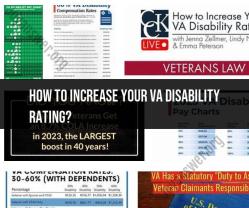Does SSDI help with VA claim?
Social Security Disability Insurance (SSDI) and Department of Veterans Affairs (VA) disability benefits are separate programs with distinct eligibility criteria and purposes. However, they can interact in certain situations:
Separate Programs: SSDI is a federal program administered by the Social Security Administration (SSA) that provides financial assistance to individuals with disabilities who have paid into the Social Security system through payroll taxes. On the other hand, VA disability benefits are provided to veterans with service-connected disabilities as a result of their military service.
No Impact on VA Benefits: Receiving SSDI benefits does not directly impact your eligibility for VA disability benefits. The VA does not reduce or offset your VA disability compensation due to SSDI payments.
Medical Evidence: When applying for either SSDI or VA disability benefits, having medical evidence of your disabilities and their severity is crucial. While the VA and SSA use different criteria to determine disability, medical records and documentation from healthcare providers can be valuable for both claims.
Disability Ratings: The VA assigns disability ratings to veterans based on the severity of their service-connected conditions. These ratings determine the level of compensation. SSDI, on the other hand, uses a different set of criteria to determine eligibility and the amount of benefits, primarily focusing on the inability to engage in substantial gainful activity.
Different Application Processes: Applying for SSDI and VA disability benefits involves separate processes. You will need to submit separate applications to each agency, providing the necessary documentation and evidence to support your claims.
Legal Assistance: Some individuals may choose to seek legal representation or assistance from organizations specializing in veterans' benefits when navigating both SSDI and VA claims. Legal professionals can help ensure that all necessary documentation is provided and that your claims are properly presented.
It's important to note that receiving one type of disability benefit does not automatically guarantee approval for the other. Each program has its own eligibility criteria and decision-making process. While SSDI and VA disability benefits serve different purposes, they can provide financial support to individuals with disabilities who meet the respective eligibility requirements. If you are considering applying for both types of benefits, it's advisable to seek guidance from professionals who are experienced in veterans' benefits and disability claims to navigate the processes effectively.
SSDI and VA Claims: Exploring the Interplay Between Disability Benefits
Social Security Disability Insurance (SSDI) and Veterans Affairs (VA) disability benefits are two separate programs that provide financial assistance to people with disabilities. SSDI is a federal program that is administered by the Social Security Administration (SSA), while VA disability benefits are administered by the Department of Veterans Affairs (VA).
Both SSDI and VA disability benefits are available to people with disabilities who are unable to work due to their condition. However, there are some key differences between the two programs. SSDI is available to people who have worked in Social Security-covered employment and paid Social Security taxes for a certain amount of time. VA disability benefits are available to veterans who have a service-connected disability.
Another key difference between SSDI and VA disability benefits is the way they are calculated. SSDI benefits are based on the worker's average earnings over a certain period of time. VA disability benefits are based on the severity of the veteran's disability.
Dual Benefits: Understanding How SSDI Can Impact Your VA Claim
Veterans who are approved for VA disability benefits may also be eligible for SSDI benefits. However, it is important to note that SSDI benefits can offset VA disability benefits.
For example, if a veteran receives $1,000 in VA disability benefits and $500 in SSDI benefits, their total monthly income would be $1,500. However, the SSA would only count $1,000 of this income when calculating the veteran's SSDI benefits. This means that the veteran would receive a reduced SSDI benefit amount.
Navigating Disability Claims: The Role of SSDI in VA Compensation
Veterans who are considering filing a VA disability claim may want to consider filing for SSDI benefits as well. This is because SSDI benefits can provide financial assistance while the VA claim is pending.
The VA claims process can be lengthy and complex. It can take several months or even years for a VA claim to be processed. SSDI benefits can provide financial assistance during this time.
In addition, SSDI approval can strengthen a veteran's VA disability claim. The SSA has a more rigorous standard for disability than the VA. This means that if a veteran is approved for SSDI benefits, it is more likely that they will also be approved for VA disability benefits.
If you are a veteran with a disability, it is important to understand the relationship between SSDI and VA disability benefits. You may be eligible for both types of benefits, and filing for SSDI benefits can help you navigate the VA claims process.
Here are some tips for navigating disability claims:
- Gather all of your medical records and documentation of your disability.
- Be honest and complete when filling out your disability claim forms.
- Get help from a Veterans Service Organization (VSO) or other qualified professional.
- Be patient and persistent. The disability claims process can be long and complex, but it is important to see it through.







